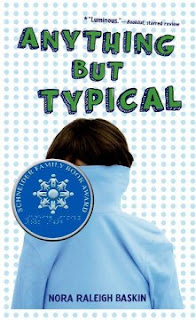
Realistic Fiction, Autism, Families, Friendship, Literary Devices, Emotional & Social Intelligence, Writing
Book Description
School Library Journal (March 1, 2009)
Gr 4-7-Baskin writes in the voice of a high-functioning boy who identifies himself as having numerous disorders, most with labels that appear as alphabet soup. In the third grade, after yet another battery of tests, Jason receives the diagnosis of autism. Now in sixth grade, he relates how he does not fit in, even though he tries to follow the instructions of his therapists and helpers. He labels the rest of his classmates and teachers as neurotypicals, or NTs for short. While humor resonates throughout the book, the pathos of Jason's situation is never far from readers' consciousness. If only he could act on what he knows he needs to do, his life would be so much easier. Jason also shows himself to be a deep thinker and an excellent writer. Through his stories and thinly veiled fictional characters, Baskin reveals not only the obstacles that Jason faces, but also his fierce determination to be himself at all costs. Jason is a believable and empathetic character in spite of his idiosyncrasies. Baskin also does a superb job of developing his parents and younger brother as real people with real problems, bravely traversing their lives with a differently abled child without a road map, but with a great deal of love.-Wendy Smith-D'Arezzo, Loyola College, Baltimore, MD Copyright 2009 Reed Business Information.
My Comments
Five Stars! Jason's character portrays the confusion, intelligence, and emotions of an autistic child in this spare and heartbreaking story. It brings to life the day in the life of an autistic child. Young readers will be pulled into Jason's world in this short, readable story, allowing them to empathize with people who are struggling with disabilities. A book like this could greatly benefit the social culture of a classroom, encouraging kindness and patience. I enjoyed reading Jason's descriptions of the writing process and literary devices which could be helpful examples for ELA teachers.
No comments:
Post a Comment